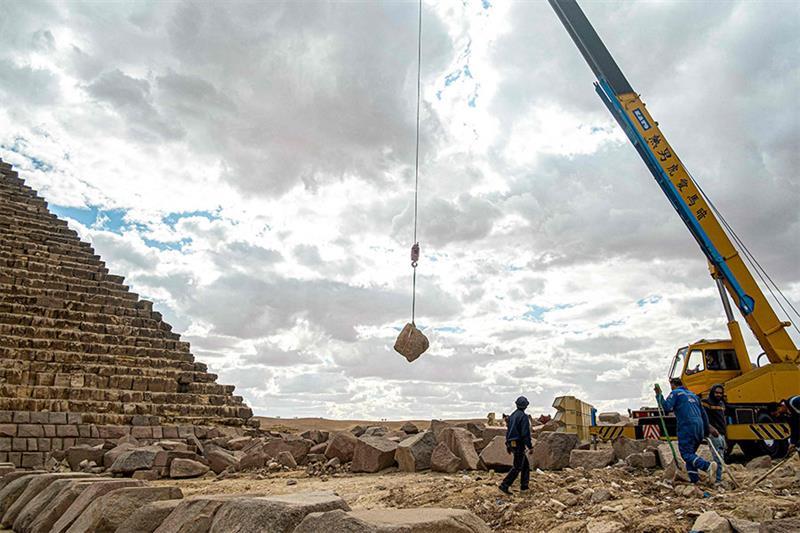Review committee unanimously rejects restoring casing blocks to Menkaure Pyramid of Giza
Nevine El-Aref , Thursday 15 Feb 2024
The Menkaure Pyramid Review Committee (MPRC) has unanimously rejected a plan to restore the granite casing blocks scattered around the base of the smallest of three Pyramids of Giza for thousands of years onto the monument to preserve the universal and archaeological value of the site.

The MPRC was formed last week per a decree issued by Minister of Tourism and Antiquities Ahmed Issa to review the restoration project for the Menkaure Pyramid at Giza Plateau Menkaure which was introduced by an Egyptian Japanese archaeological team from the SCA and the Waseda University.
The committee rejected the project citing the importance of maintaining the pyramid's current state without alterations given its exceptional universal and archaeological value.
Its decision was submitted in a report to Minister Issa.
"It would be impossible to ascertain the exact original position of any of the casing blocks. Therefore, it is impossible to return any of them to their original location on the pyramid. Consequently, any re-installation of the casing blocks would change the ancient, original fabric and appearance of the pyramid, which would conceal important evidence of how the ancient Egyptians designed and built the Pyramids," the MPRC report read.
According to the report, the committee granted initial consent to carry out archaeological excavations to uncover the Menkaure Pyramid boat pits (akin to those discovered near the Pyramids of Khufu and Khafre), contingent upon the provision of clear and detailed scientific studies to be submitted to the MPRC before the commencement of any excavations.
Moreover, the MPRC declared that the search of the pyramid boat pits should not be a high priority, nor a reason for excavating the base of the Menkaure Pyramid.
This project should state broader, more scientific reasons for undertaking such excavations.
The MPRC also endorsed the scientific archaeological project proposed for studying and surveying the Menkaure Pyramid, organizing the fallen granite blocks of its outer casing, and conducting excavations to uncover the sloping debris around the pyramid, as well as the cleaning and organization of the site for visitation.
However, the MPRC affirmed that no scientific or archaeological activities in this project should commence until the project manager presents a comprehensive research proposal, including a detailed scientific work plan, for discussion by the committee which will subsequently submit a scientific report to the Ministry of Tourism and Antiquities for coordination with UNESCO and presentation to the Permanent Committee for ancient Egyptian Antiquities.
The research proposal should state the sources of funding to carry out the project and the time frame required for implementation as well as a list of team members and résumés for each.
The team should consist of skilled archaeologists experienced in the best practices of stratigraphic excavation and recording, in addition to an architectural historian, with experience in ancient Egyptian architecture and restoration, and an engineer experienced in cultural heritage and restoration.
Meanwhile, the project director should be employed full-time on the Menkaure Pyramid Project. He should not be otherwise employed or assigned other duties within the Ministry of Tourism.
The committee said that it was able to complete its work efficiently thanks to the documents provided by the Supreme Council of Antiquities (SCA), among them the decisions taken by the Permanent Committee for Ancient Egyptian Antiquities showing its agreement on the architectural restoration project of Menkaure Pyramid submitted by the Egyptian-Japanese archaeological team from the SCA and Waseda University.
It is chaired by renowned Egyptologist and former minister of antiquities Zahi Hawass and consists of six pioneering engineers and archaeologists from Egypt, the US, the Czech Republic, and Germany.
These are Mamdouh El-Damaty, former minister of antiquities and supervisor of the Egyptology Section at the Faculty of Archaeology at Ain Shams University; Hany Helal, former minister of education and professor of engineering at the Faculty of Engineering at Cairo University; Mostafa El-Ghamrawy, former head of the Civil Engineering Department at Cairo University; Mark Lehner, director and president of the Ancient Egypt Research Associates; Dietrich Raue, head of the German Archaeological Institute in Cairo, and Miroslav Bárta, director of the Czech Institute of Egyptology at the Faculty of Arts of Charles University.
-- Sent from my Linux system.
No comments:
Post a Comment